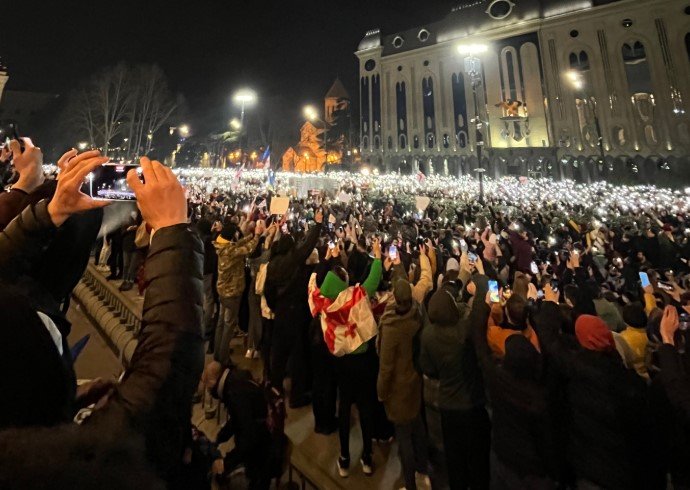Georgian Authorities Urged to Respect Freedom of Expression and Assembly
The UN High Commissioner for Human Rights, Volker Türk, issued a call to Georgian authorities on Monday, urging them to safeguard the rights of citizens to express themselves freely and to assemble peacefully. This plea comes after four nights of protests in Tbilisi, Georgia’s capital, that turned violent. The demonstrations were triggered by an announcement from the Georgian Prime Minister regarding the postponement of negotiations on the country’s European Union membership.
The protests, deemed legitimate by international observers, were met with aggressive tactics by the police, including the use of water cannons, pepper spray, and chemical irritants. In several cases, protesters and journalists were physically assaulted by unidentified individuals. Dozens were reportedly injured during the course of the demonstrations.
Violence at the Protests: Unnecessary Force by Police
The protests in Tbilisi were sparked by political frustration over delays in the country’s EU accession talks, but what followed has raised serious concerns about the state’s treatment of its citizens. According to the UN rights chief, security forces used disproportionate force to disperse crowds, violating human rights standards that protect peaceful assembly. The response from law enforcement has been heavily criticized, especially given the use of chemical agents and the physical attacks on journalists who were simply doing their jobs.

“The use of unnecessary or disproportionate force against protesters and media workers is extremely worrying,” said Mr. Türk. “All Georgians from across the political spectrum should be able to express their views about the future of their country freely and peacefully.”
Reports also suggest that police officers were not identifiable during the protests, making it difficult to hold individual officers accountable for misconduct. This has been a longstanding issue in Georgia, where riot police often lack proper identification. The UN High Commissioner pointed out that law enforcement must take steps to ensure better accountability, such as having officers wear nametags or individual service numbers. This simple measure could go a long way in preventing abuses of power.
Violent Clashes and the Toll on Media Workers
The UN rights office has also highlighted the disturbing impact these protests have had on media freedom. Journalists covering the unrest were reportedly targeted by security forces, and several have sustained injuries. In one case, reporters were chased by assailants, further exacerbating the volatile situation. The UN emphasized that the press should be allowed to report freely and without fear of retaliation.
International human rights standards are clear: governments are responsible for creating a safe environment where journalists can carry out their work without threat of harm. “Media workers play a crucial role in ensuring that the public is informed about matters of national importance. Their protection is essential,” said the UN rights office.
The violence during the protests has prompted calls for greater press protections in Georgia, where the media is already facing increasing pressures. Journalists have reported harassment in the past, and this recent incident has only highlighted the need for stronger protections for the press.
Accountability for Law Enforcement: Investigations Underway
In response to the violence, Georgia’s Special Investigation Service, an independent body accountable to Parliament, has launched an investigation into the conduct of law enforcement during the protests. The focus is on potential abuse of authority by police officers, with an emphasis on the treatment of detainees.
At least 224 individuals were arrested over the course of the protests, with charges ranging from petty hooliganism to disobeying lawful orders. Alarmingly, reports indicate that children were among those detained, prompting serious concerns about the protection of their rights. The UN rights chief urged Georgian authorities to immediately release those detained for exercising their rights to free speech and peaceful assembly.
The investigation is still ongoing, and the Special Investigation Service has vowed to hold those responsible for misconduct accountable. However, the lack of identifiable officers makes it difficult to pinpoint who was responsible for acts of aggression, highlighting a serious flaw in the country’s law enforcement system.
International Standards and Georgia’s Commitment to Human Rights
The ongoing protests in Georgia serve as a reminder of the need for governments to respect their citizens’ basic freedoms. International law stipulates that the right to peaceful assembly is fundamental and must be upheld at all costs. The UN rights office is calling on Georgian authorities to act in accordance with international human rights standards and to ensure that any use of force by security personnel is both justified and proportionate.
Moreover, the detention of individuals—especially minors—during protests is a grave concern. The UN High Commissioner emphasized the importance of guaranteeing the rights of detainees, including access to legal counsel and medical care. “Those facing other charges should be guaranteed all their rights to due process, presumption of innocence, and the right to challenge the lawfulness of their pre-trial detention,” said Mr. Türk.
The rights chief also reminded Georgian authorities of their obligations under international law to create an environment that fosters free expression and peaceful assembly. Only through a commitment to these principles can Georgia hope to build a future where its citizens can freely voice their opinions without fear of retribution.
